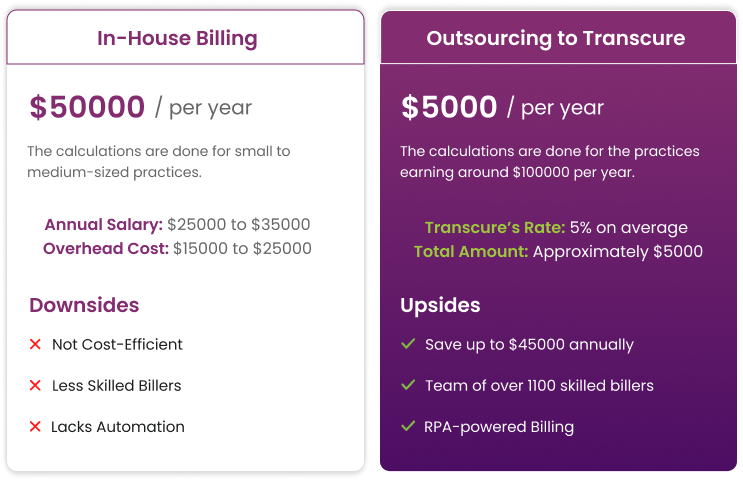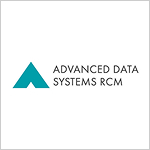Medical billing outsourcing involves hiring expert third-party billers to handle your practice’s coding, claims submission, and collections. With this approach, clinics can free themselves from administrative burdens so they can focus on patients.
Due to the increasing demand for the outsourced RCM team, the United States market for outsourced medical billing is forecast to reach around $18.7 billion by 2034. According to the Precedence Research report, the increase from $5.9B in 2024 is mainly due to challenges in handling in-house billing teams and increasing claim denials.
Based on the MGMA research, these shortcomings of in-house billers have led to 36% of practices planning to outsource or automate part of their RCM in 2025. Read on to learn how medical billing outsourcing works and how to make it pay off.
Table of Contents
ToggleWhat Is Medical Billing Outsourcing?
Medical billing outsourcing means contracting a specialized team to manage your practice’s billing and coding instead of doing it in-house. The outsourced medical billing firm handles tasks like charge entry, coding, claim submission, denial appeals, and patient billing.
In effect, you entrust your financial paperwork to trained billers and coders. This lets your staff devote more time to care while making sure that claims are processed by outsourced billing services providers.
Who Needs Outsourced Billing Services and Why It’s Gaining Popularity?
Although practices of all sizes require medical billing outsourcing, the following healthcare providers will need these services on an urgent basis.
- Small and Rural Practices: As they lack dedicated billing staff due to budget shortage, outsourcing billing services will prove to be a cost-effective solution.
- Rapidly Growing Practices: In-house billers are not sufficient for clinics adding providers or locations, so outsourced billing services provide scalable support.
- Multi-Specialty Clinics: Practices will need outsourced medical billing, as complex coding across specialties like oncology is easier to handle by experts.
- Overburdened Staff: Healthcare practices with heavy patient loads can offload billing tasks by outsourcing billing to avoid burnout.

Demand is high because outsourcing frees providers from tiresome admin work. Analysts note that outsourcing allows healthcare providers to focus more on patient care, reduces billing errors, and ensures regulatory compliance. You can also check our detailed guide on why an outsourcing company is important for your practice’s success to know better.
What Are the Main Differences Between In-House and Outsourced Billing Services?
To choose billing aid based on your needs, go through this detailed comparison between in-house and outsourced billing services.
| Aspect | In-House Billing | Outsourced Billing |
|---|---|---|
| Expertise and Staffing | Managed by the practice’s internal team, often with a small staff. | Handled by specialized billers and coders trained in current regulations. |
| Cost Structure | Fixed overhead, including salaries, benefits, software, and training. | Variable fee (often a percentage of collections) with no long-term payroll commitments. |
| Technology | Practice must purchase/maintain billing software and updates. | Vendor provides advanced RCM tech (AI/RPA, EHR integrations). |
| Revenue Performance | Practices average around a 70% collection rate with slower cash flow. | Outsourced vendors can boost collections to approximately 95% with faster reimbursements. |
| Focus on Care | Staff juggle billing with patient care, reducing clinical focus. | Offloaded billing lets providers focus on patients and growth. |
| Flexibility | Limited by staff capacity. | Services can scale up and down with patient volume. |
Why Are Practices Turning to Outsourced Medical Billing?
As seen from the comparison, in-house billers have certain limitations when it comes to handling billing tasks. Here, we will further elaborate on the need to outsource medical billing services for financial betterment.
- Shortage of Skilled Billing Staff: Recruiting and retaining certified billers is increasingly difficult, especially for small practices. In contrast, outsourcing billing services gives immediate access to experienced professionals without the cost of training in-house staff.
- Increasing Administrative Burden: Tasks like insurance verification and compliance audits consume time and distract practices from patient care. In one industry report, 61% of providers plan to use third-party billing services to relieve billing tasks.
- Growing Coding Challenges: Regulatory changes and complex coding standards create constant compliance pressure. To tackle this issue, outsourced companies stay updated on laws like HIPAA and ICD-10 to help practices avoid penalties.
- Lack of Expertise and Tech: As in-house billing teams lack the advanced knowledge to tackle complex tasks, outsourcing billing helps practices solve this problem. Providers get certified coders and advanced RCM tools. For example, Transcure uses AI-driven automation, with data from over 4 million billing rules, to streamline the process.

What are the Top Benefits of Outsourcing Medical Billing Services?
To make the medical billing outsourcing decision easier for you, here we will introduce you to the benefits that practices enjoy with outsourced billers.
1. Significant Cost Savings
By using outsourced medical billing, practices can cut operational expenses by up to 30 to 40%, eliminating salaries and training overhead. After freeing those funds, providers can utilize them for patient care and tech upgrades per industry studies.
2. Improved Revenue and Faster Payments
Expert billers reduce claim denials and speed up turnaround. Research by Dr Chrono shows outsourced billing can boost collection rates to around 95%, accelerating cash flow.
3. Reduced Errors and Better Compliance
Outsourced billing coders stay current on coding rules and payer policies, minimizing claim rejections. Outsourcers often guarantee a high “first-pass” accuracy. As one industry observer notes, outsourcing reduces billing errors and ensures regulatory compliance.
4. More Time for Patient Care
With billing offloaded, physicians and staff devote more time to patients. A recent analysis points out that outsourcing allows healthcare providers to focus more on patient care, improving patient satisfaction, and practice growth.
5. Scalability and Flexibility
As your practice changes by adding locations or specialties, an outsourcing medical billing partner can quickly scale services up or down. You won’t need to hire or train new staff or drop temporary workers. This flexibility prevents workflow bottlenecks during growth.
How to Pick the Best Outsourced Medical Billing Company for Your Practice?
If you have decided to outsource medical billing, you need to know the right specifications to pick the best billers. Go through these points to join hands with the best outsourced billing company.
- Specialization and Fit: Select a vendor experienced in your specialty and practice size. The MGMA recommends choosing partners with experience in your specific practice area.
- Pricing and Contract Terms: Healthcare providers should understand their pricing model, such as percentage or per-claim fees. They should also discuss any setup or termination fees with their outsourced medical billing partner.
- Technology and Integration: Practices need to make sure that the outsourced billing team offers modern RCM tools and can integrate with your EHR. Ask about their use of automation, such as AI and RPA bots, and custom integrations for a seamless workflow.
- Transparent Reporting: The outsourced billing vendor should provide clear financial reports and KPIs, including collections, denials, and AR days. Check if they offer dashboards or regular summaries so you can monitor performance.
- Compliance and Security: Always confirm if the provider is HIPAA-certified and uses strong cybersecurity. They should have processes for data encryption, breach response, and compliance training.

What Questions to Ask While Medical Billing Outsourcing?
Before signing up, practices should test their potential billing partner with these questions.
- What specialties and types of practices have you served?
- Can you integrate with our existing EMR/EHR system?
- What pricing model do you use, and what fees should we expect?
- How do you handle data security and HIPAA compliance?
- What KPIs and reports will you provide, and how often?
- How will you manage claim denials and appeals?
- Can you share references or case studies from practices like ours?
All of these questions will help you ensure the outsourced billing company’s capabilities and approach match your practice’s needs.
Which Pricing Model Will Suit Practices When Outsourcing Medical Billing?
Outsourced billing services providers typically use one of several pricing models:
- Percentage of collections
- Flat fee per claim
- Hybrid approach
In a percentage-based model, the vendor charges a fixed rate (often 4 to 10%) of the actual revenue they collect. On the other hand, a flat-fee model bills a set amount for each claim or encounter. Hybrid models mix the two, offering one rate for certain claims, another per claim.
Industry research shows percentage models are very common and often economical for practices. MGMA notes that outsourcing fees average about 5% of collections. This aligns the outsourced billing company’s incentives with the practice. For example, Transcure uses a percentage-of-collections structure with no hidden monthly minimums or any onboarding fees. In general, our percentage model is favored because it scales with your income and motivates our medical billing outsourcing team to maximize reimbursements. Here is how our pricing structure is better than hiring in-house billers:

Top 5 Outsourced Medical Billing Companies
Now that you are well aware of the criteria and fee structures, let’s go through some of the best outsourced billing companies. After thorough research, we have finalized these five companies as your best outsourced medical billing partners.
1. Transcure

Transcure stands out as a leading US‑based medical billing outsourcing firm that delivers transparent RCM solutions. With over 1100 certified billing experts, they serve across around 40 specialties, including dental billing services and podiatry medical billing. Moreover, their RPA‑powered platform automates claim scrubbing, denial management, and provides real‑time financial reporting.
Our outsourced billing services providers act as a one‑stop solution, covering credentialing, coding, claims submission, and compliance support. With transparent percentage‑based pricing and full-day support, Transcure helps practices maximize revenue and focus on patient care.

2. 24/7 Medical Billing Services

With over 12 years of multi‑specialty billing expertise, this outsourced billing team offers multiple services, ranging from coding to denial management. Backed by certified coders and dedicated account managers, they deliver up to 98% clean claims on first submission. Their seamless transitions across major EHR platforms ensure scalability for clinics of any size.
3. Outsource Strategies International

OSI has decades of experience in healthcare RCM. Their team provides a comprehensive suite of services, including billing, coding, and credentialing, and is known for handling high claim volumes for large clinics. Their main strength lies in their seasoned management team, which helps stabilize revenue cycles for diverse medical and dental practices.
4. Advanced Data Systems RCM

ADS provides end-to-end billing and coding services with an emphasis on analytics. They use advanced RCM software to automate workflows and integrate with common EHRs. Practices working with ADS often cite their detailed reporting and personalized support. This outsourced billing company suits practices that want hands-on customization and strong tech tools.
5. P3 Healthcare Solutions

Being an RCM company focused on client engagement, they highlight budget-friendly pricing and round-the-clock support. Their best services include claims scrubbing and denial tracking to help practice get their deserved revenue. All in all, their outsourced billing team serves over 500 physicians, which shows their commitment to well-rounded services.
How Outsourced Billing Services Proceed with the Onboarding Process?
If you have decided to outsource medical billing services to Transcure, analyze these onboarding steps to see how we can collaborate.

1. Welcome Call: To begin, your dedicated account manager schedules an introductory call to outline timelines. During this call, he will answer your questions and set expectations for the onboarding journey.
2. Implementation Questionnaire: Moving forward, you will complete a structured form detailing your specialties, locations, and EHR systems. Moreover, your practice needs to share the provider roster and current workflows to give our outsourced billing team the necessary context.
3. Onboarding Meeting: In a live session, usually via video conference, your staff will have to grant secure access to your EHR and billing platforms. Through this virtual meeting, both sides will review data transfer steps.
4. Establishing Workflow SOPs: Based on your input, Transcure’s experts draft customized Standard Operating Procedures that map out every stage of your revenue cycle, from charge capture to denial management.
5. Go‑Live Date: Once testing is complete and SOPs are approved, a mutually agreed‑upon launch date is set. On this date, Transcure formally takes over your billing operations, with real‑time reporting kicking in immediately.
Transcure even provides training sessions so everyone understands the new workflow. Although the exact steps can differ from one company to another, the goal is always a smooth transition with minimal disruption. Once live, the outsourced medical billing team fully assumes the billing operations, while your practice continues receiving reports and support.
Conclusion
In summary, outsourcing medical billing can transform a practice’s revenue cycle. By handing billing and coding to specialists, providers reduce costs and unlock more time for patient care. We’ve covered why medical billing outsourcing is growing, its benefits, and best practices.
Ultimately, the right partner makes all the difference. For example, Transcure stands out with its comprehensive RCM service and commitment to data-driven results. Practices that choose proven outsourcing firms like Transcure report faster claim turnaround and improved cash flow.
Frequently Asked Questions (FAQs)
Is medical billing outsourcing worth it for small practices?
Absolutely, small clinics often can’t afford a full billing team. By outsourcing medical billing, they access skilled billers and tech without heavy overhead. Outsourcing lets small practices achieve high collection rates and faster payments while doctors focus on patients.
Can outsourced billing handle multiple specialties?
Yes, top outsourced billing companies serve many specialties under one roof. For instance, Transcure’s team is trained in over 40 specialties, from podiatry to cardiology. This means they understand the coding complexities of each area.
What happens if I want to switch outsourced billing company?
Transitioning between outsourced billing partners is a common process. Best practice is to plan carefully and work closely with both the old and new vendor. According to industry guidance, you should create a timeline, train your staff, and migrate records systematically. Many practices run both systems in parallel briefly to ensure no claims are lost.
What are the common challenges of medical billing outsourcing?
The biggest challenge when outsourcing a billing company is loss of control, as you’re trusting revenues to an outside team, which may feel uncomfortable. Data security is another worry, so you must ensure the partner is HIPAA-compliant and has strong safeguards. Communication gaps can also occur if expectations aren’t aligned.









